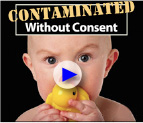August 4, 2014
Contact: Coming Clean, (802) 251-0203, info@comingcleaninc.org
Toxics in Dollar Tree Store Products? New Mega-Merger Provides Opportunity to Provide Safer Products
(Washington, DC) Health, business, consumer, and community advocates view the new $8.5 billion merger of Dollar Tree Stores and Family Dollar Stores as an opportunity to accept the responsibility as one of the largest retail operations serving low-income customers to increase their awareness and process for determining the safety of the products they sell, and move forward to also strengthen their policy for insisting on safer products from their suppliers.
“These stores - which are estimated to reap $18 billion each year - sell products to mostly people of color and low income communities. The consumers who shop at Dollar Tree are already disproportionately impacted by toxic chemicals, and the local producers who sell products in these communities are undercut by the low-cost of these toxic products” says Michele Roberts from the Environmental Justice and Health Alliance. “This new giant retail entity has an especially important responsibility to their customers and the communities where they are located to make sure the products are safe from harmful toxics and to not add more harm to the legacy of toxic chemical exposures that already exists”.
“Dollar Tree is already aware that legacy contaminants in products are impacting overburdened communities that they service, says Sister Nora Nash of the Sisters of St Francis of Philadelphia, shareholders with the company. Since 2005, the company has engaged in some product testing for BPA, phthalates, PVC, lead, and cadmium and according to the company’s 2013 Sustainability Report, they are still "working on ways to reduce or eliminate the use of PVC in products and packaging." Sr. Nora envisions that “this new merger will be a way to really influence the market for low income communities to be assured of safer products. It may also lower liability for the company and its shareholders."
“Some retailers such as Staples are using the GreenScreen tool as a way to identify safer alternatives to toxics in products,” adds Bev Thorpe with Clean Production Action, and co-coordinator of Work Group for Safe Markets, “Dollar Tree might consider GreenScreen or some similar tool to aid their assessment of chemicals in its products along with a transparent corporate chemicals policy to offset a general perception that toxic or dangerous products might be ‘dumped’ into conventional dollar store inventories.”
“We are encouraged that as this merger gives them an enlarged customer base and greater purchasing power with suppliers, they will also enhance their policy on chemicals they allow in the products on their shelves, much as the Bed, Bath, and Beyond has done with their Restricted Substances List," says Bobbi Chase Wilding with the Getting Ready for Baby Campaign at Clean and Healthy New York. "More and more retailers are insisting that their suppliers provide inventory that avoids harmful chemicals.”
“We look forward to hearing from Dollar Tree about how they have furthered their protocol for evaluating toxics in the products they sell,” says Richard Moore from Los Jardines Institute. “Consumers are more and more aware now that the toxic chemical regulatory process has failed the marketplace, and that it is incumbent upon retailers to demand products that have been tested and evaluated by independent scientific review.”
In testing consumer products for hazardous chemicals from various bulk discount variety stores, As You Sow, an environmental nonprofit organization and one of the leading enforcers of California's Safe Drinking Water and Toxic Enforcement Act (Proposition 65), found high levels of lead in baby powder that exceeded not only the Proposition 65 legal limits but also CA's hazardous waste limits (total threshold limit concentrations). Through legal action, As You Sow was able to successfully halt the distribution and sale of these toxic products at all variety stores in California.
"The baby powder is just one example of a consumer product that contains extremely high levels of a toxic chemical. Short of testing all products on the shelves for hazardous chemicals, we must rely on the retailer's vigilance of their suppliers to ensure that safe products are sold to their customers. As retailers grow in size - and increase their purchasing power- so does their responsibility to be accountable for the safety of their consumer products", said Eleanne van Vliet, Director of Toxic Chemicals Research at As You Sow.
Additional Resources
National Work Group for Safe Markets
Available for Comment
Bobbi Chase Wilding; Deputy Director, Clean & Healthy New York; (518) 708-3875, bobbi@cleanhealthyny.org. Ms. Chase Wilding can address working with retailers on toxics in baby products with the Getting Ready for Baby campaign.
Richard Moore; Los Jardines Institute; Co-Chair, Environmental Justice and Health Alliance for Chemical Policy Reform; (505) 301-0276, ljinewmexico@gmail.com. Richard can discuss the health impacts on workers and communities from chemicals exposure.
Nora M. Nash; OSF Director, Corporate Social Responsibility, Sisters of St. Francis of Philadelphia; (610) 558-7661. Sister Nash and the Sisters of St. Francis are shareholders in Dollar Tree.
Michele Roberts; Co-Coordinator, Environmental Justice Health Alliance for Chemical Policy Reform; (202) 704-7593, mroberts@comingcleaninc.org. Michele can discuss the disproportionate impacts from toxic chemicals on communities of color.
Beverley Thorpe; Consulting, Co-Director, Clean Production Action; Co-Coordinator, Workgroup for Safe Markets, Coming Clean; bev@cleanproduction.org. Bev can address the use of GreenScreen for Safer Chemicals with major retailers to identify hazards from toxic chemicals in their products.
Eleanne van Vliet, MPH; Director, Toxic Chemicals Research, As You Sow; (510) 735-8154. Eleanne can address testing of hazardous chemicals in consumer products.
# # #




